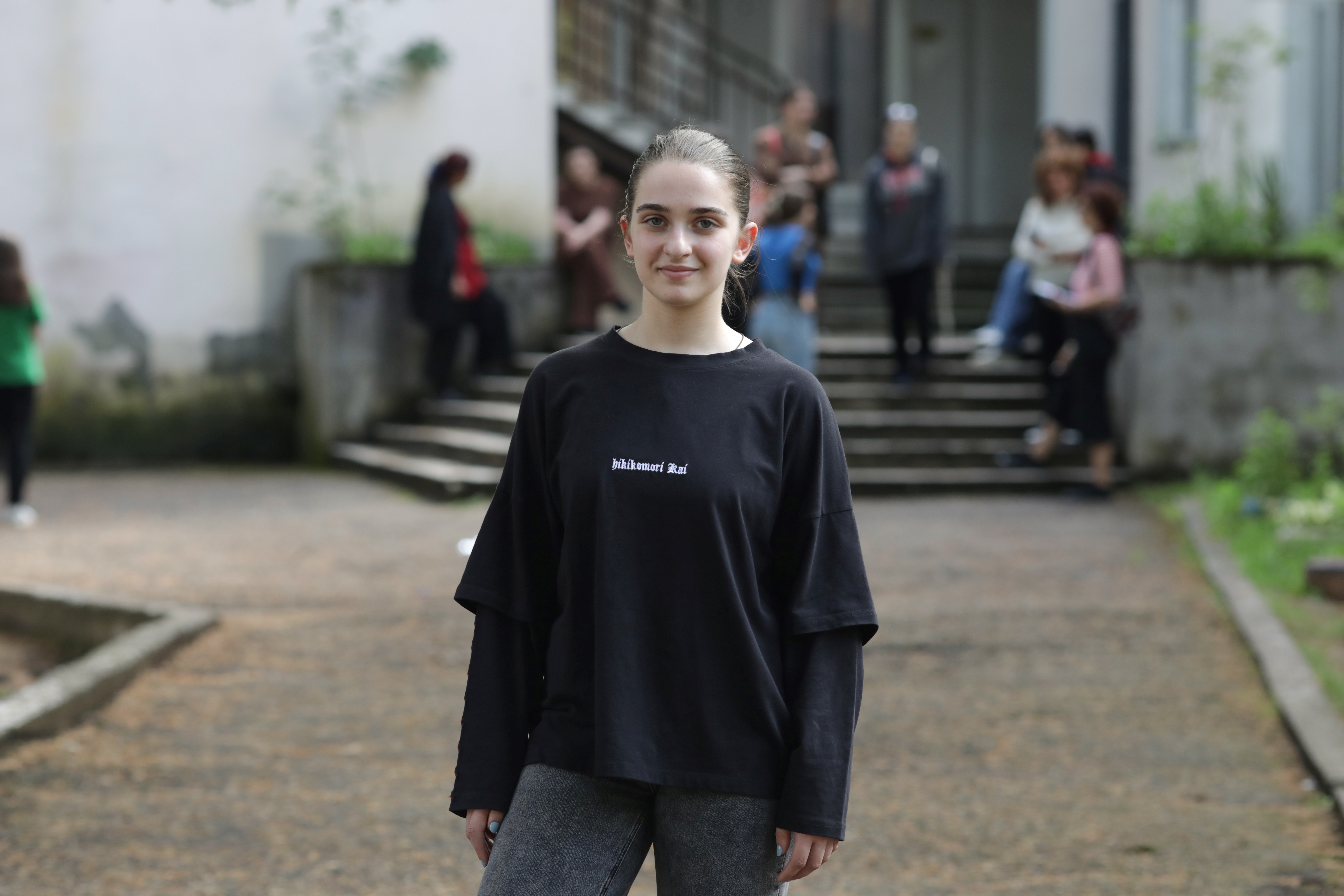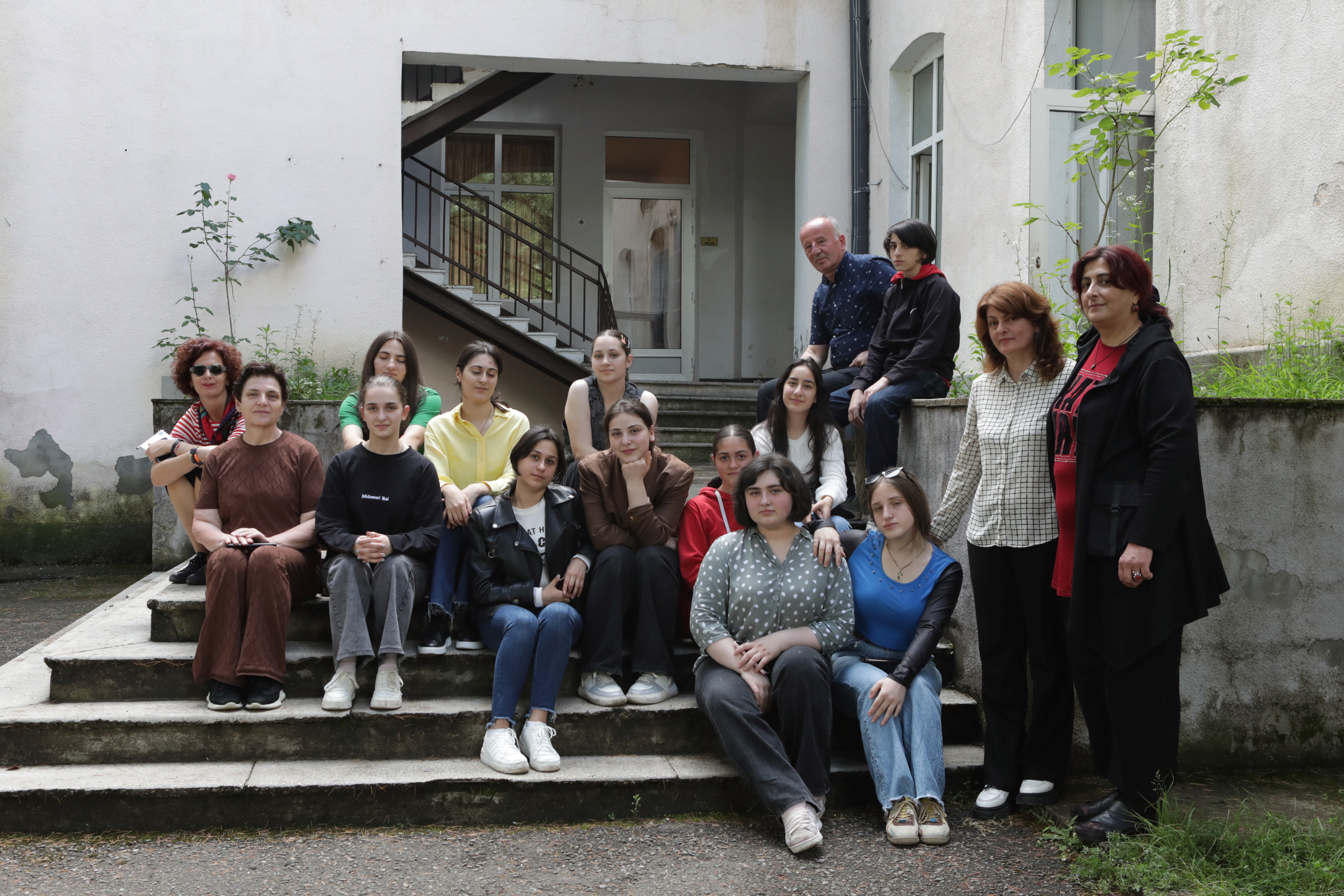UNDP and Switzerland Help Bridge the Gap Between Education and Employment
Empowering the Future: Vocational Training for Georgia’s Youth
July 11, 2024

Elene Letodiani, Tsageri
"It's the 21st century! Everyone should have at least some understanding of technology. After all, we live in a digital age," says Elene Letodiani, 16, from highland Tsageri, a successful graduate of the digital technology course now available at her public school.
Elene and many other young people in Georgia's rural regions are taking advantage of a new educational model that directly brings training courses from vocational colleges to their schools.
In a world driven by skills and technology, access to quality education can lift people out of poverty and pave the way to success. Conversely, its absence deepens societal inequalities, preventing some from reaching their full potential.
In Georgia, where unemployment averages 14 percent and exceeds 20 percent in some regions, public and private employers often cite a lack of professional skills as a major hiring obstacle (Source: EU/UNDP. 2022). Youth unemployment is particularly high, ranging from 28 to 50 percent for people aged 15 to 29 (Source: GEOSTAT) Additionally, 34 percent of Georgian youth are classified as NEET (not engaged in employment, education, or training) and only 5 percent of Georgian secondary school graduates choose to enter vocational education.
School-based vocational training integrated into secondary school curricula can effectively address these gaps, providing young people with the skills needed for their future careers. Furthermore, such educational programmes enhance links between schools and vocational colleges, increasing the social role of educational institutions. This builds a knowledge ecosystem where schools supply eager-to-learn students and colleges are better able to offer vocational training that is tailor-made for the local labour market.
UNDP and Switzerland have been working for nearly a decade to help Georgia's educational system rethink outdated approaches to vocational training and introduce a thriving educational model which prepares youth for economic activity by bringing together colleges, schools, youth, and local employers.
“With skilled labour still in short supply in Georgia, this school-based vocational training narrows the gap between education and jobs, benefiting both young people and their future employers,” says Barbara Böni, Regional Director of Cooperation South Caucasus, Embassy of Switzerland in Georgia.
“We help young people take quality vocational training while still at school and so get a taste of a career that allows them to better shape their future professional path,” says Douglas Webb, UNDP Resident Representative in Georgia.
In 2017, the pilot stage of this transformative programme covered four public colleges and six schools in four regions: Samegrelo-Zemo Svaneti, Samtskhe-Javakheti, Kakheti, and Mtskheta-Mtianeti. After the pilot's success, Georgia’s Ministry of Education and Science expanded the programme to 259 schools and 32 public and private colleges nationwide, benefiting up to 10,000 students in the 8th and 9th grades.
In 2022, the programme continued in partnership with the Vocational Skills Agency aiming to transform regional vocational colleges into skills hubs that offer rural schools vocational training and other support. Six vocational colleges and ten public schools have been selected for this initiative, covering the Ajara Autonomous Republic and the regions of Imereti, Guria, Kakheti, and Racha-Lechkhumi-Kvemo Svaneti.

Gonio Public School
Miracle Workers for Ajara’s Miracle Economy
Georgia’s Autonomous Republic of Ajara is an example of rapid development and impressive economic growth. Its dazzling coastline, sea trade routes, subtropical terrains, stunning highlands, and vibrant cities and villages create a fascinating tapestry of economic opportunities.
Vocational education is in high demand, with several colleges across the region offering courses in fields like hospitality, IT, electricity, car mechanics, fashion design, agriculture, construction, and other popular trades. For the 2023-2024 academic year, Black Sea College in Batumi received ten times more applications than it could accommodate. However, these competitive education centres are mainly located in cities like Batumi and Kobuleti, which limits access to vocational training for those in rural areas.
UNDP and Switzerland, in partnership with Georgia’s Vocational Skills Agency, are working to bridge this gap by bringing vocational courses to rural schools.
“Ajara is a special region thanks to its thriving tourism and hospitality businesses. Many households have family ventures such as guesthouses, hotels or restaurants. After completing relevant vocational courses, their children can join these family enterprises as trained professionals. Vocational education benefits are obvious. Employers line up to hire our graduates,” shares Nata Partenadze, Vocational Training Programme Coordinator at Black Sea College in Batumi.
Through UNDP and Switzerland’s support, Black Sea College connected with the public school in the seaside village of Gonio. Similarly, New Wave College in Kobuleti teamed up with the public school in the agricultural village of Mukhaestate.
“I want to be a barista. But I also enjoyed training in hospitality services. Both courses are extremely useful and great fun,” says Dima Makharadze, 16, from the Gonio Public School.
Dima’s classmates share his enthusiasm and determination. Emily Goradze, 16, says that she loved every minute of the training and was fascinated by the barista and service professions.
“My friends from other schools got excited when I told them about the training. They would be keen to join if vocational courses are included in their school curriculum,” notes Emily.
Roland Davitadze, 16, from the Mukhaestate Public School, believes vocational education is the first step toward entrepreneurship.
“My goal is to master the hospitality profession and then use this knowledge to start a business,” Roland shares.
Starting in September 2023, up to 120 high school students from Gonio and Mukhaestate have enrolled in vocational training courses offered by top regional educational centres. Each student, with their own dreams and aspirations, received mentorship and skills to shape their future. Both schools benefited from guidance and practical assistance from the colleges, ensuring the quality and sustainability of the training programme.

Tsageri Public School
Building Skills for Tourism in Tsageri
Nestled in the Racha-Lechkhumi-Kvemo Svaneti region, Tsageri is a gem of Georgia’s highlands, distinguished by its stunning views and rich history. With tourism as a key development priority, the municipality is focused on building hospitality infrastructure, promoting sightseeing places, and preparing qualified personnel for employment at tourist sites.
With support from UNDP and Switzerland, the Vocational Skills Agency connected Tsageri Public School #1 with Erkvani College in Ambrolauri, a regional skills hub offering vocational courses in various professions. Through this partnership, over 50 high school students learned graphic design, hospitality, and tour guiding directly at their school.
“The tour guide course was incredible! It helped us better understand our region and its history, and share this knowledge with others,” says Lizi Saginadze, 16.
“Students and their parents were impressed with the learning experience. After three months of training, the students could guide tours like professionals. To celebrate, the course concluded with a grand excursion to famous cultural monuments,” shares Lamzira Kopaliani, teacher of the Tour Guide Programme.
Many students are eager to continue their education, requesting additional vocational courses, such as fashion design and business skills, to enrich their school classes.

Liza Tskipurishvili, Tkibuli
Revitalizing Tkibuli: New Skills for a New Era
“Working with the soil is an incredible experience, especially when you know the theory and understand what you are doing! We learned new skills, like planting, watering, and soil testing. I was proud to work in a greenhouse and grow plants,” says Liza Tskipurishvili, 16, from Satsire Public School.
Liza’s home municipality, Tkibuli, has been known for coal mining for over 150 years. Mines sustained the local economy but also threatened human lives and health, causing widespread environmental damage. With the demand for coal decreasing, mines dwindling, and new opportunities emerging across the country, the 'miners’ city' is striving to find its place in Georgia’s growing economy and offer reliable career prospects to the younger generation. Diversified vocational training focused on agriculture, construction, and technology can help the region overcome its mining past and open doors to new development areas.
“Culinary is my favourite vocation. I am considering a career in this field and will continue my studies in college. Woodworking and gemstone carving would also be quite interesting. These trades are in high demand in our region,” notes Luka Kashibadze, 17.
The Satsire Public School is one of ten rural schools across Georgia supported by UNDP, Switzerland, and the Vocational Skills Agency to connect with regional colleges and integrate vocational training into their curricula. More than 40 high school students have already benefitted, opening pathways to careers and prosperity for young Georgians.
UNDP and Switzerland will continue supporting the selected schools through the end of the 2024-2025 school year to maintain vocational classes for new student cohorts. In the long run, the schools will be assisted in accrediting this new vocational training through the upcoming school authorization process, transferring responsibility for costs and quality supervision to the Ministry of Education and Science.
“We help young people take quality vocational training while still at school and so get a taste of a career that allows them to better shape their future professional path."Douglas Webb, UNDP Resident Representative in Georgia
Background Information:
With funding from Switzerland, UNDP supports ongoing educational reforms in Georgia, focusing on developing a robust vocational education and training system, primarily in agriculture. This initiative enhances educational institutions, promotes public-private partnerships, and improves skills and competencies to meet market demands. The comprehensive support brings together key players in the educational system, including the Ministry of Education and Science, the Ministry of Environmental Protection and Agriculture, education institutions, private enterprises, and civil society organizations.

 Locations
Locations





